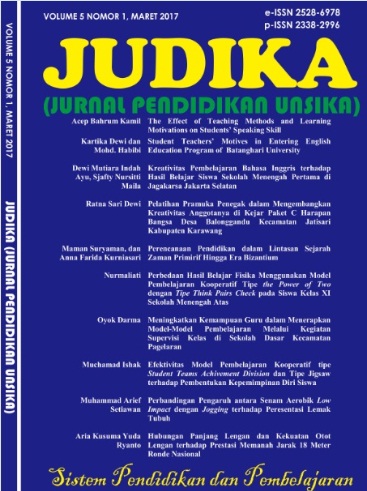THE EFFECT OF TEACHING METHODS AND LEARNING MOTIVATIONS ON STUDENTS’ SPEAKING SKILL
DOI:
https://doi.org/10.35706/judika.v5i1.679Abstract
This research is aimed at findings out the 1) difference between discussion and role play method in affecting students’ speaking skill; 2) interaction of teaching methods and learning motivation on students’ speaking skill; 3) if role play is more effective for the students with high learning motivation than discussion on students’ speaking skill; 4) if discussion is more effective for the students with low learning motivation than role play on students’ speaking skill. This research was factorial design where the class was divided into two classes and four groups. The total of sample of each group is 20 students. So the total of sample is 80 students. This research was conducted eight time meetings. The instruments of this research are learning motivation questionnaire and test. The result of the research shows that, there was no interaction between learning motivation and teaching method. This result supported by the result of two ways a nova Fobserved 2.98 < Ftable 3.97, but the implementation of group discussion method is effective to improve the speaking skill with students who are high motivation than students who are low motivation. The difference is based on the level of students’ motivation. Thus, it can be concluded that for the students with high motivation, discussion is more effective than role-play on students’ speaking skill. Therefore, role-play is more effective than discussion on students’ speaking skill for students who have low learning motivation at the eleventh grade of SMAN 1 Pangkalan Karawang.
Keywords: Role play, Discussion, learning motivation, speaking skill
Downloads
References
Brown, H. D. 2001. Teaching by Principles, an Interactive Approach to Language
Pedagogy. New York: Prentice Hall-Regents.
__________. 1994. Principal of Language Learning and Teaching. New York: Prentice Hall-Regents.
Byrne, D. 1994. Teaching Oral English. New York: Longman
_______. 1987. Techniques for Classroom Interaction. New York: Longman Group.
Cole, P. G., and Chan, K. S. 1994. Teaching Principles and Practice. Second Edition. New York: Prentice Hall.
Finnocchiaro, M. and Bonomo, M. 1973. Teaching and Learning a Foreign Language. New York: Regent Publishing Company, Inc.
Fraenkel, J. R. and Wallen, N. E. 2007. How to Design and Evaluate Research in Education. Sixth Edition. Singapore: McGraw – Hill International Edition.
Ghozali, I. 2008. Desain Penelitian Eksperimental. Semarang: Badan Penerbit Universitas Diponegoro.
Harmer, J. 2007a. The Practice of English Language Teaching. New York: Longman.
_________. 2007b. How to Teach English. New York: Longman.
Haycraft, J.1993. An Introduction to English Language Teaching. UK: Longman Group
Heaton, J. B. 1988. Language Testing. Oxford: Modern English Publication.
Hughes, A. 1989. Testing for Language Teachers. Cambridge: Cambridge University Press.
Killen, R. 1998. Effective Teaching Methods. Katoomba NSW: Social Science Press
Lynch, K. B. 1996. Language Program Evaluation. Theory and Practice. Cambridge: Cambridge University Press.
Lukman, E. I. 2004. Headlight: An Extensive Exposure to English Learning for SMA students. Jakarta: Erlangga
Neufeldt, V. 1996. Webster’s New World College Dictionary. New York: Macmillan. Inc.
O’Malley, J.M., and Pierce, L.V. 1996. Authentic Assessment for English Language Learners: Practical Approaches for Teachers. America: Longman.
Paese, P.C. 1984. “The Effects of Cooperating Teacher Intervention and a Self-Assessment Technique on the Verbal Interactions of Elementary Student Teachers”. Journal of Teaching in Physical Education. 3, (3), 51-58.
Petty, G. 2004. A Practical Guide: Teaching Today. United Kingdom: Nelson Thornes Ltd.
Ratih, K. 2005. “Motivation in Improving the Speaking Skill of non-English Department Students of Muhammadiyah University of Surakarta”. Jurnal Penelitian dan Humaniora. 6, (1).
Rosnija, E. M., and Salam, U. 2014. “Improving Students’ Speaking Ability in Using Expressions for Asking, Giving, and Refusing Opinion through Role-Play Technique”. Jurnal Pendidikan dan Pembelajaran. 3, (11).
Sinclair, C. 2008. “Initial and Changing Student Teacher Motivation and Commitment to Teaching”. Asia?Pacific Journal of Teacher Education. 36, (2), 79-104.
Sudarwati, T. M., and Grace, E. 2007. Look Ahead: An English Course for Senior High School Year XI. Jakarta: Erlangga.
Th?, N. T. N. 2011. The Use of role-play activities in improving speaking skills of first year chemistry majors at Ha Noi University of Industry. University of Languages and International Studies: Vietnam.
Thornbury, S. 2005. How to Teach Speaking. England: Longman



